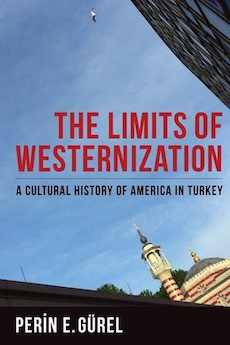By Lewis Fried
Spanning East and West, Turkey is wedded to both; its self-understanding, and Western comprehension of it are hard to separate. Add complex and ironic to cultural interpretation.
Gurel’s book brilliantly begins with a plea by a Turkish liberal intellectual group, represented by Halide Edib, who, in a 1918 letter sent to Woodrow Wilson, asked the United States “to take Ottoman Turkey under its imperial wing.” The supplication points to the difficulty of “finding” modern Turkey. Is it studied by asking to which sphere of influence or domain does it belong? To one, or to both? Is an American mandate a called-for submission to Westernization or simply a request to aid a unique Turkish national development? Must a mapping of this civilization become an inside account, devolving upon the country’s own “narrative” (famously provided by Ataturk in his speech “Nutuk”); or depend upon transculturation; or a Kulturkampf; or seen as an item in a catalogue of domination (as in various US government wishes that Turkey become “Westernized”).
It takes a bold and sensitive historian to ask these questions. Gurel is both. Her book, deeply textured, and invariably insightful, studies Turkish culture through its interpretation, accommodation, and transfiguration of American influence. We have, as the work unfolds, both a study of method and a method of study.
Gurel focuses on selected aspects of Turkish civilization in which a rhetoric holds tropes and figures in tension. Often reinterpreted, they are hybridized as the East and West struggle for an authoritative meaning. The discourses are not what they seem in the West’s understanding and often not wished for by Turkish cultural nationalists. Turkish thinkers have addressed this perplexity as exigent. How can it be made literal, suggesting what Turkey was, is, and should become? (For example, many of Orhan Pamuk’s novels grapple with this conflict of allegiances and insuperable reconciliation.)
The Limits of Westernization, in Gurel’s words, “foregrounds figurative language and stock figures as keys to reconsidering the connections between culture and international relations.” Her first justification—and she offers three—is that our emotions are responsive to rhetoric. Because “political discourse” expresses power, “intersectional figures of gender and sexuality” exemplify contested or accepted authority, if not authorities. The second point is that “stock figures and rhetorical tropes” are labile, moving between “official and informal domains.” The third is that “local, transculturated figures can provide glimpses into political lifeworlds [sic] “not immediately (and possibly not at all) legible from the outside.” A consequence is that culture is seen as “process” rather than “product,” as “a space of contention as well as consensus.”
The Limits of Westernization has two governing and major concerns: “Over Westernization” and “Under-Westernization.” The book moves easily (but not without some creaking) from the subject of Turkish nation-building; to seeing America both positively and negatively as a civilization leaving an imprint (either accepted, or transformed or rejected); to a discussion of the powers of a culturally sexualized imagination suffusing politics and civil life; to a new understanding (or hope of one) of cultural relations between the United States and Turkey.
These are no small topics. Gurel’s research is prodigious; her interpretations, timely. Whereas she provides her reasons for finding the above-mentioned subjects as significant, one can easily ask why the values of technologies and science, for example, both dependent upon positivism—and hence disrupters of folklore and tradition—are not given a deeper presence. However, a reader should not ask if a book is faithful to one’s interest but in what way it is faithful to its writer’s goal. Gurel’s study is not simply a “good read” but a “must read” in order to comprehend modern Turkey, and I might add, a contemporary America.
Lewis Fried (ΦBK, Queen‘s College, CUNY, 1964) is Professor of English Emeritus at Kent State University and a resident member of the Nu of Ohio Chapter of Phi Beta Kappa.




